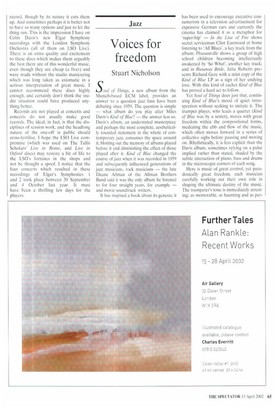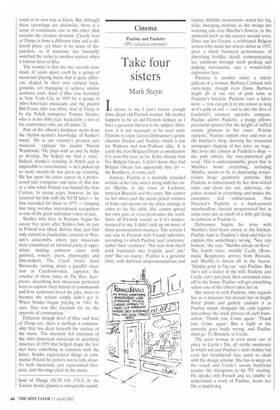Jazz
Voices for freedom
Stuart Nicholson
Soul of Things, a new album from the Munich-based ECM label, provides an answer to a question jazz fans have been debating since 1959. The question is simple — what album do you play after Miles Davis's Kind of Blue? — the answer less so. Davis's album, an understated masterpiece and perhaps the most complete, aesthetically rounded statement in the whole of contemporary jazz, consumes the space around it, blotting out the memory of albums played before it and diminishing the effect of those played after it. Kind of Blue changed the course of jazz when it was recorded in 1959 and subsequently influenced generations of jazz musicians, rock musicians — the late Duane Allman of the Allman Brothers Band said it was the only album he listened to for four straight years, for example — and movie soundtrack writers.
It has inspired a book about its genesis; it
has been used to encourage executive consumerism in a television advertisement for expensive German cars and currently the cinema has claimed it as a metaphor for 'super-hip' — In the Line of Fire shows secret serviceman Clint Eastwood at home listening to 'All Blues', a key track from the album; Pleasantville shows a group of high school children becoming intellectually awakened by 'So What', another key track; and in Runaway Bride, Julia Roberts presents Richard Gere with a mint copy of the Kind of Blue LP as a sign of her undying love. With this kind of cachet Kind of Blue has proved a hard act to follow.
Yet Soul of Things does just that, continuing Kind of Blue's mood of quiet introspection without seeking to imitate it. The trumpet player, who leads a quartet (Kind of Blue was by a sextet), moves with great freedom within the compositional forms, mediating the ebb and flow of the music, which often moves forward in a series of collective sighs before pausing and moving on. Rhythmically, it is less explicit than the Davis album, sometimes relying on a pulse implied rather than stated, shaded by the subtle interaction of piano, bass and drums in the microscopic corners of each song.
Here is music of great control, yet paradoxically great freedom, each musician carefully working out their own role in shaping the ultimate destiny of the music. The trumpeter's tone is immediately arresting; as memorable, as haunting and as per sonal in its own way as Davis. But although these recordings are dissimilar, there is a sense of continuum, one to the other, that sustains the creative moment. Clearly Soul of Things is from a different time and a different place, yet there is no sense of disjunction, as if someone has boorishly switched the radio to another station, when it follows Kind of Blue.
The wonder is that the two records were made 42 years apart, each by a group of musicians playing music that is quite different, shaped by their own cultural backgrounds, yet managing to achieve similar aesthetic ends. Kind of Blue was recorded in New York City in 1959 by a group of Afro-American musicians and the pianist Bill Evans, who was white. Soul of Things is by the Polish trumpeter Tomasz Stanko, who is in his 60th year, backed by a trio of his countrymen who are all under 24.
Part of the album's freshness stems from the rhythm section's knowledge of Stanko's music. 'He is our country's greatest jazz musician,' explains his pianist Marcin Wasilewski. 'He plays with us and he helps us develop. He helped me find a voice.' Indeed, Stanko's standing in Polish jazz is impossible to overestimate — he's picked up so many awards he has given up counting. He has spent his entire career as a professional jazz trumpeter and most of that was at a time when Poland was behind the Iron Curtain. In recent years, however, he has renewed his link with the ECM label — he first recorded for them in 1975 — bringing him long overdue international recognition as one of the great individual voices in jazz.
Stanko, who lives in Warsaw, began his career five years after Stalin's ban on jazz in Poland was lifted. Before that, jazz had only existed in clandestine concerts in Warsaw's catacombs, where jazz musicians were considered an informal party of opposition, making common cause with painters, writers, poets, playwrights and film-makers. The Czech writer Josef Slcvorecky, writing about a parallel situation in Czechoslovakia, captures the essence of those times in The Bass Saxophone, describing how musicians perfected ways to express their hatred of communism and how audiences loved the joke, more so because the system simply didn't get it. When Stanko began playing in 1961, he says, 'Jazz was like freedom for us, the opposite of communism.'
Different though Kind of Blue and Soul of Things are, there is perhaps a commonality that lies deep beneath the surface of the music. The intensely felt emotions of the Afro-American musicians in apartheid America of 1959 that helped shape the former have something in common with the latter. Stanko experienced things in communist Poland he prefers not to talk about. To both musicians, jazz represented freedom, and this rings clear in the music.



















































































 Previous page
Previous page